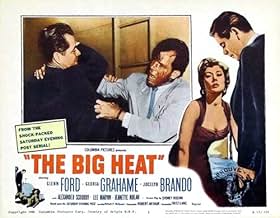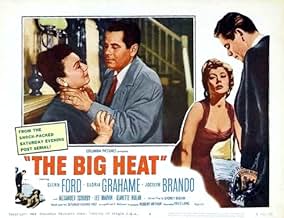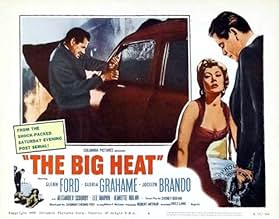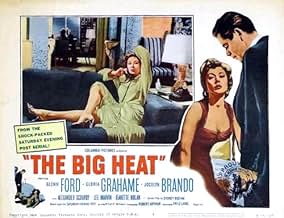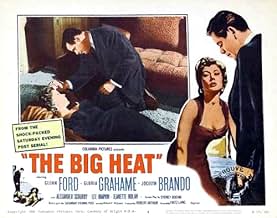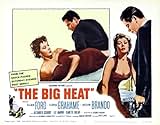Il duro poliziotto Dave Bannion affronta un sindacato criminale politicamente potente.Il duro poliziotto Dave Bannion affronta un sindacato criminale politicamente potente.Il duro poliziotto Dave Bannion affronta un sindacato criminale politicamente potente.
- Regia
- Sceneggiatura
- Star
- Premi
- 2 vittorie e 2 candidature totali
Recensioni in evidenza
Normally, when I think of Film Noir, I DON'T think about Glenn Ford. Yes, he did a few, but his personality always seemed a little too "nice" to play in these gritty films. I was very pleasantly surprised then, when I saw this movie. Ford is an honest cop in a very crooked town. However, when the mob attacks and nearly kills him (killing his wife instead), he "pops a fuse" and becomes a very tough cop who won't take NO for an answer. I loved watching him slap people around and threaten his way to the top of the syndicate, as, with his life in ruins, he had nothing to lose.
Along the way, the headstrong Ford encounters a lot of amazing characters--all played exceptionally well. In particular, a young Lee Marvin gives perhaps his best supporting performances as a hood who has a penchant for beating up women. In one scene, he nearly breaks a bit actress' arm (and it happens to be Carolyn Jones in a performance before she was famous). In another scene, he throws scalding hot coffee in the face of his girlfriend, Gloria Grahame. It was so brutal and realistic, I flinched and found my stomach churning at its ferocity and cruelness. As for Miss Grahame, she plays the sort of excellent role she became known for--a "dame" who, down under layers and layers of scum, beats a real human heart.
Wonderful performances, terrific pacing and excellent writing make this one film well worth seeing and as a result, it's one of the best examples of Film Noir out there and a great example of a film about a cop who's seen enough and is on a rampage. This is probably Glenn Ford's best performance.
FYI--In what appears to be a cool inside joke, in one of the scenes where Ford is in the bar, the song "Mame" is playing in the background--the same song made so memorable by Rita Hayworth in GILDA--a Glenn Ford film from 1946.
Also FYI--I recently saw this film for the second time. I rarely watch films twice, but this one impressed me so much the first time, I couldn't resist. The film was, believe it or not, better the second time around and I noticed so many wonderful Film Noir touches that I truly love this movie.
Along the way, the headstrong Ford encounters a lot of amazing characters--all played exceptionally well. In particular, a young Lee Marvin gives perhaps his best supporting performances as a hood who has a penchant for beating up women. In one scene, he nearly breaks a bit actress' arm (and it happens to be Carolyn Jones in a performance before she was famous). In another scene, he throws scalding hot coffee in the face of his girlfriend, Gloria Grahame. It was so brutal and realistic, I flinched and found my stomach churning at its ferocity and cruelness. As for Miss Grahame, she plays the sort of excellent role she became known for--a "dame" who, down under layers and layers of scum, beats a real human heart.
Wonderful performances, terrific pacing and excellent writing make this one film well worth seeing and as a result, it's one of the best examples of Film Noir out there and a great example of a film about a cop who's seen enough and is on a rampage. This is probably Glenn Ford's best performance.
FYI--In what appears to be a cool inside joke, in one of the scenes where Ford is in the bar, the song "Mame" is playing in the background--the same song made so memorable by Rita Hayworth in GILDA--a Glenn Ford film from 1946.
Also FYI--I recently saw this film for the second time. I rarely watch films twice, but this one impressed me so much the first time, I couldn't resist. The film was, believe it or not, better the second time around and I noticed so many wonderful Film Noir touches that I truly love this movie.
This is a classic film noir, beautifully directed by Fritz Lang.. Fast paced non stop plot line & action... Glenn Ford is the good guy with some shades of gray/ Lee Marvin is the bad guy and boy is he bad ; roughs up 2 women/ Carolyn Jones at the bar, slams her hand/ and poor Gloria Grahame/ throws hot boiling coffee in her gorgeous face.. This is a very sadistic scene, and very memorable!!Gloria plays her part to the hilt.. one of her greatest screen moments...She made several film noire movies, In A Lonely Place/ Naked Alibi etc. won her Oscar for a serio comedy role in The Bad & The Beautiful/ sang "I Cant Say No" in Oklahoma.. and was almost crushed by an elephant in The Greatest Show On Earth.. she had a great career... and will always be my favorite 50's bombshell...this film is not to be missed/ Great support by Alex. Scourby, Jeanette Nolan and others.. not to be missed !
A violent story about a detective working in a corrupt department who investigates the apparent suicide of a fellow officer. Worth seeing for Glenn Ford's prototypical performance and Gloria Grahme's show stealing portrayal of a boozing moll with a conscience. With facial disfigurement and cigarette burns it took violence up a notch from the standard gun play of the past, making it grimmer and more realistic, and giving the story more punch. Grahme's tough and tender role stands out and gives the film a tragic element, while certain of its portrayals of greed and corruption (namely the dead officer's wife) stand out for their attention to detail. In the end, it IS the details that give this formulaic story its clout, and we can thank director Fritz Lang for that.
Coming full cycle, Hollywood seems to be back on the theme of good cop vs. bad cops controlled by the mob. Recently "16 Blocks" successfully pitted honest Bruce Willis against dishonest city hall. For a time, with "The Big Easy" being an early example, this type movie presented the image of a totally corrupt government from top to bottom with omnipresent mob ties indicating cynical times, even the one good cop being tainted, just not as much as others. "The Big Heat" is a prime example of this type film in the early Cold War period, emphasizing the importance of one good man standing up against all odds, in particular unconcerned citizens who either themselves become tainted or who are simply apathetic as long as they are left alone. "The Big Heat" like "High Noon" showed that the good must take a stand or the entire house will come crumbling down with the rodents taking over.
Glenn Ford was never a versatile actor. In the right role he could carry the load sufficiently to get by. In the wrong role, his acting was amateurish. That he had potential is indicated by his performances in two movies, "Gilda" and "The Big Heat." Arguably, his role as Det. Sgt. Dave Bannion is the better of the two. Perhaps it is the inimitable director Fritz Lang that prods Ford on to realize his true talents. There is no doubt that Ford makes Sgt. Bannion come alive and puts real flesh on his bones. Ford is so good in this film and in "Gilda" that he deserved more recognition than he got from the Hollywood big wigs.
The two shining performances are given by Gloria Grahame and Lee Marvin who run away with the show. They provide one of the legendary scenes in film history that just about everyone has either seen or read about, when Vince Stone (Marvin)--note the last name of Stone--pitches a container of boiling coffee into Debby Marsh's (Grahame) face, scarring her for life. Vince Stone's demise is also memorable. The coffee sequence alone is worth the price of admission.
Glenn Ford was never a versatile actor. In the right role he could carry the load sufficiently to get by. In the wrong role, his acting was amateurish. That he had potential is indicated by his performances in two movies, "Gilda" and "The Big Heat." Arguably, his role as Det. Sgt. Dave Bannion is the better of the two. Perhaps it is the inimitable director Fritz Lang that prods Ford on to realize his true talents. There is no doubt that Ford makes Sgt. Bannion come alive and puts real flesh on his bones. Ford is so good in this film and in "Gilda" that he deserved more recognition than he got from the Hollywood big wigs.
The two shining performances are given by Gloria Grahame and Lee Marvin who run away with the show. They provide one of the legendary scenes in film history that just about everyone has either seen or read about, when Vince Stone (Marvin)--note the last name of Stone--pitches a container of boiling coffee into Debby Marsh's (Grahame) face, scarring her for life. Vince Stone's demise is also memorable. The coffee sequence alone is worth the price of admission.
Fritz Lang can conjure up a paranoid thriller with the greatest of ease (actually, it's probably a lot of work, but it looks easy, which is a feat unto itself), and The Big Heat provides some of his classic paranoia to the proceedings of a story of a good, hard cop on the trail of a case that's gone way too corrupt. There are simple visual touches, amid what looks like a standard-shot thriller (when compared to, say, M, which is Godly in its vision of the darkness of humanity's layers peeled back). But it's got the kind of grit to it that most likely inspired Dirty Harry, even if, arguably, Glenn Ford isn't quite as great a star as Clint Eastwood. He's got a style to himself, anyway, like someone who is almost TOO good, and knows it, which is why he'll get the job done even if it means some busted knuckles and a few cracked heads. He's a compelling force as Dave Bannion, and he's perfectly cast against a bunch of sinister, slimy characters (save for the women, and even one of them is just rotten).
After a cop seems to have killed himself, the case looks open and shut. But there seems to be more for Bannion, as he didn't seem like a guy, from some accounts, to do himself in. Turns out there's a big cheese named Lagana who wants this put hush-hush like, and pays off the widow to keep a letter he wrote under wraps. But Bannion is suddenly put to the test, if only of himself, when his family is put in danger (with, of course, tragic results). Lang doesn't stop for a detail that isn't worthy of the attention of the narrative, and there's a connection that he makes between the world of the criminal underworld and the law: it's a place where there's some gray, but the black and white aspect rings through due to the situation at hand: corrupt cops, dirty criminals, and only a couple of dames to trust in the mix of it (one of them Debby, played in another great turn by Gloria Grahame, takes a savage incident with a pot of coffee via Lee Marvin's hand to wise up).
It might not have the depth of an M or Scarlett Street, but the Big Heat is about as solid a genre piece as one could ask for, getting more harrowing from the first gun shot of the picture all the way to the final moment when Bannion leaves the office for a hit-and-run case (a cop's work is never finished, one might suggest). It's also got more intelligence for its conventional roots with the little things; for example, there's a point in the movie where something pivotal could've happened with Bannion's daughter and the thugs, but Lang makes a good step to push aside it, keeping the focus squarely on the task at hand instead of sidestepping the climax into cliché. Land understands how, for the sake of a piece of pulp fiction like this, to keep the lines in order, even if it might seem standard for today: keep Bannion's family wholesome, maybe TOO wholesome, with stories of three little kittens, and keep the criminal elements savage, sinister in their grins and suits and violence brimming underneath.
One things for sure, it doesn't get much less thrilling than seeing Ford and Marvin in an unpredictable shoot-out. A+
After a cop seems to have killed himself, the case looks open and shut. But there seems to be more for Bannion, as he didn't seem like a guy, from some accounts, to do himself in. Turns out there's a big cheese named Lagana who wants this put hush-hush like, and pays off the widow to keep a letter he wrote under wraps. But Bannion is suddenly put to the test, if only of himself, when his family is put in danger (with, of course, tragic results). Lang doesn't stop for a detail that isn't worthy of the attention of the narrative, and there's a connection that he makes between the world of the criminal underworld and the law: it's a place where there's some gray, but the black and white aspect rings through due to the situation at hand: corrupt cops, dirty criminals, and only a couple of dames to trust in the mix of it (one of them Debby, played in another great turn by Gloria Grahame, takes a savage incident with a pot of coffee via Lee Marvin's hand to wise up).
It might not have the depth of an M or Scarlett Street, but the Big Heat is about as solid a genre piece as one could ask for, getting more harrowing from the first gun shot of the picture all the way to the final moment when Bannion leaves the office for a hit-and-run case (a cop's work is never finished, one might suggest). It's also got more intelligence for its conventional roots with the little things; for example, there's a point in the movie where something pivotal could've happened with Bannion's daughter and the thugs, but Lang makes a good step to push aside it, keeping the focus squarely on the task at hand instead of sidestepping the climax into cliché. Land understands how, for the sake of a piece of pulp fiction like this, to keep the lines in order, even if it might seem standard for today: keep Bannion's family wholesome, maybe TOO wholesome, with stories of three little kittens, and keep the criminal elements savage, sinister in their grins and suits and violence brimming underneath.
One things for sure, it doesn't get much less thrilling than seeing Ford and Marvin in an unpredictable shoot-out. A+
Lo sapevi?
- QuizColumbia wanted to borrow Marilyn Monroe from 20th Century-Fox to play the role of Debby Marsh, but Fox's asking price was too high. Gloria Grahame was cast instead.
- BlooperThe street address for the junkyard on Bannion's list is "101", yet the number "1024" is seen on a large sign over the yard's shed.
- Citazioni
Debby Marsh: [to Bannion] Oh, well, you're about as romantic as a pair of handcuffs.
- ConnessioniFeatured in Mean Streets - Domenica in chiesa, lunedì all'inferno (1973)
- Colonne sonoreIt's a Blue World
(uncredited)
Written by Chet Forrest and Bob Wright
Heard instrumentally during one of the scenes at The Retreat
I più visti
Accedi per valutare e creare un elenco di titoli salvati per ottenere consigli personalizzati
Dettagli
- Data di uscita
- Paese di origine
- Lingua
- Celebre anche come
- Io, la legge
- Luoghi delle riprese
- Azienda produttrice
- Vedi altri crediti dell’azienda su IMDbPro
Botteghino
- Lordo in tutto il mondo
- 7083 USD
- Tempo di esecuzione1 ora 29 minuti
- Colore
- Proporzioni
- 1.37 : 1
Contribuisci a questa pagina
Suggerisci una modifica o aggiungi i contenuti mancanti



